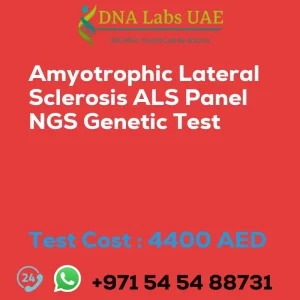RNASEH1 Gene Progressive External Ophthalmoplegia with Mitochondrial Deletions Type 2 Autosomal Recessive Genetic Test
Test Name: RNASEH1 Gene Progressive External Ophthalmoplegia with Mitochondrial Deletions Type 2 Autosomal Recessive Genetic Test
Components: RNASEH1 Gene Progressive External Ophthalmoplegia with Mitochondrial Deletions Type 2 Autosomal Recessive Genetic Test
Price: 4400.0 AED
Sample Condition: Blood or Extracted DNA or One drop Blood on FTA Card
Report Delivery: 3 to 4 Weeks
Method: NGS Technology
Test Type: Neurological Disorders
Doctor: Neurologist
Test Department: Genetics
Pre Test Information: Clinical History of Patient who is going for RNASEH1 Gene Progressive External Ophthalmoplegia with Mitochondrial Deletions Type 2 Autosomal Recessive NGS Genetic DNA Test. A Genetic Counselling session to draw a pedigree chart of family members affected with RNASEH1 Gene Progressive External Ophthalmoplegia with Mitochondrial Deletions Type 2 Autosomal Recessive.
Test Details: The RNASEH1 gene is associated with a condition called progressive external ophthalmoplegia with mitochondrial deletions type 2 (PEO2). This condition is inherited in an autosomal recessive manner, which means that both copies of the gene must have a mutation for the individual to be affected. NGS (Next-Generation Sequencing) genetic testing is a type of genetic testing that uses advanced technology to analyze multiple genes simultaneously. In the case of PEO2, NGS can be used to identify mutations in the RNASEH1 gene that may be causing the condition. By identifying mutations in the RNASEH1 gene, NGS genetic testing can help confirm a diagnosis of PEO2 and provide information about the specific genetic changes that are present. This information can be useful for understanding the underlying cause of the condition, predicting the likelihood of passing it on to future generations, and potentially guiding treatment options. It is important to consult with a healthcare professional or genetic counselor for a comprehensive evaluation and to discuss the implications of genetic testing for PEO2. They can provide more detailed information about the specific genetic test, its limitations, and its potential benefits.
| Test Name | RNASEH1 Gene Progressive external ophthalmoplegia with mitochondrial deletions type 2 autosomal recessive Genetic Test |
|---|---|
| Components | |
| Price | 4400.0 AED |
| Sample Condition | Blood or Extracted DNA or One drop Blood on FTA Card o |
| Report Delivery | 3 to 4 Weeks |
| Method | NGS Technology |
| Test type | Neurological Disorders |
| Doctor | Neurologist |
| Test Department: | Genetics |
| Pre Test Information | Clinical History of Patient who is going for RNASEH1 Gene Progressive external ophthalmoplegia with mitochondrial deletions type 2, autosomal recessive NGS Genetic DNA Test A Genetic Counselling session to draw a pedigree chart of family members affected with RNASEH1 Gene Progressive external ophthalmoplegia with mitochondrial deletions type 2, autosomal recessive |
| Test Details |
The RNASEH1 gene is associated with a condition called progressive external ophthalmoplegia with mitochondrial deletions type 2 (PEO2). This condition is inherited in an autosomal recessive manner, which means that both copies of the gene must have a mutation for the individual to be affected. NGS (Next-Generation Sequencing) genetic testing is a type of genetic testing that uses advanced technology to analyze multiple genes simultaneously. In the case of PEO2, NGS can be used to identify mutations in the RNASEH1 gene that may be causing the condition. By identifying mutations in the RNASEH1 gene, NGS genetic testing can help confirm a diagnosis of PEO2 and provide information about the specific genetic changes that are present. This information can be useful for understanding the underlying cause of the condition, predicting the likelihood of passing it on to future generations, and potentially guiding treatment options. It is important to consult with a healthcare professional or genetic counselor for a comprehensive evaluation and to discuss the implications of genetic testing for PEO2. They can provide more detailed information about the specific genetic test, its limitations, and its potential benefits. |








